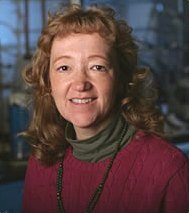
Joint with the University of Chicago Department of Chemistry
--------------
The Julius Stieglitz Award Lecture


| Joint with the University of Chicago Department of Chemistry -------------- The Julius Stieglitz Award Lecture | 
|
|---|
| Speaker: | Dr.
Joan F. Brennecke Department of Chemical and Biomolecular Engineering University of Notre Dame Notre Dame, IN |
 |
|---|---|---|
| Topic: | "Ionic Liquids: Worth Their Salt" | |
| Where: | The Parthenon Restaurant 314 S. Halsted Street Chicago, IL |
|
Abstract: Ionic liquids are non-volatile organic salts that have low melting points, frequently below room temperature. Typical compounds are comprised of a quaternary ammonium, quaternary phosphonium, imidazolium or pyridinium cation with a wide variety of common anions. Since they cannot evaporate and cause air pollution, they are being vigorously investigated as promising alternatives to volatile organic solvents. We will discuss the physical and chemical properties of ionic liquids and show how these properties can be tailored or tuned by judicious choice of cation, anion and substituents. Although water-stable ionic liquids have only been known for about fifteen years, they have already been introduced in numerous industrial processes. They are being investigated for many more applications, including as solvents for reactions, as nonvolatile electrolytes in batteries and solar cells, for gas and liquid separations, and as heat transfer fluids and high temperature lubricants. We will discuss these applications, with particular emphasis on our own work developing ionic liquids for removal of carbon dioxide from flue gas and as solvents for liquid-liquid extraction.
Biography: Her research interests are primarily in the development of less environmentally harmful solvents. In particular, her research has focused on studies of supercritical fluids, including supercritical CO2 and supercritical water. She was awarded the 2001 Ipatieff Prize from the American Chemical Society in recognition of her pioneering high pressure studies of the local structure of supercritical fluid solutions and the effect of this local structure on the rates of homogeneous reactions. Much of her current research involves ionic liquids, which are organic salts that are liquid at temperatures around ambient. These salts have received tremendous recent attention as potential substitutes for volatile organic solvents since the ionic liquids are non-volatile and, thus, cannot contribute to air pollution. In developing these solvents, Dr. Brennecke’s primary interests are in the measurement and modeling of thermodynamics, thermophysical properties, phase behavior and separations. She was awarded the 2006 Professional Progress Award from the American Institute of Chemical Engineers in recognition of her ionic liquids research and received the J. M. Prausnitz Award at the Eleventh International Conference on Properties and Phase Equilibria in Greece in May, 2007.
Dr. Brennecke is the recipient of a 1991 Presidential Young Investigator Award from the National Science Foundation, the 1998 University of Notre Dame Presidential Award, and the College of Engineering’s Outstanding Teacher of the Year (2000) and Kaneb Teaching (2002) awards. She has served on the Editorial Advisory Boards of Industrial and Engineering Chemistry Research, the Journal of Chemical and Engineering Data, Green Chemistry and the Journal of Chemical Thermodynamics. She also serves on the Governing Board of the Council for Chemical Research (Chair for 2007) and has served on the National Science Foundation Advisory Committees for Engineering and Environmental Research and Education, and the American Chemical Society Green Chemistry Institute Governing Board. She has been selected to be the U. S. scientific representative for the G8 International Green Network. She chaired the 7th International Symposium on Supercritical Fluids in 2005 and ran a Council for Chemical Research NIChE conference on ionic liquids that same year. She has co-authored more than 120 scientific and technical articles.
|
Date: Wednesday, November 19,
2008
Job Club: 5:00
PM - 6:00 PM
Social Hour: 5:30 PM - 6:30 PM -- cash bar
Dinner: 6:30 PM Note early start time for social hour and dinner!!
Presentation of Stieglitz Lecture: 8:00 PM
Cost: $30.00 for members of ACS/ $32.00 for non-members/ $15.00
for students
Call the office at (847) 647-8405 for reservations, or register on line by noon, Monday, November 17.
Please honor your reservations. We must pay for all dinners ordered. No-shows will be billed.
PARKING: Free valet parking. Parking is also available on nearby streets or in a nearby pay lot.
Dinner:
Greek Family Style Dinner--
Appetizers: Saganaki (Kaseri cheese flamed in brandy), Gyros (roasted slices of lamb and beef), Taramosalata (fish roe blended with lemon and olive oil); traditional Greek salad.
Main course: Vegetarian Spinach-Cheese Pie, Vegetarian Pastitsio (Macaroni baked with broccoli, Bechamel sauce and Kefalotiri), Dolmades (vine leaves stuffed with rice, meats and herbs), Rotisserie-roasted lamb served with rice pilaf and roasted potatoes.
Desserts: Baklava (flaky layers of Phyllo baked with nuts and honey) and Galaktobouriko (flaky layers of Phyllo with vanilla custard and baked with syrup.